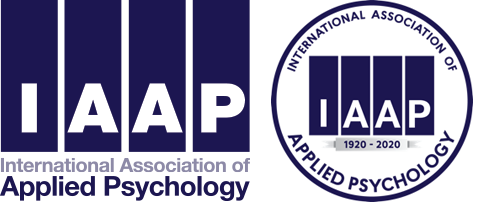Reports: Meetings / Events
“Girls Speak out”: Minding the Girls’ Rights Gap highlighted on the International Day of the Girl
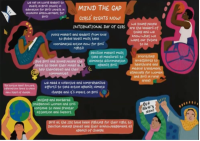 “Keep dreaming even if it breaks your heart”. These words were shared from a girl in Afghanistan determined to change the culture of her society in which she lived—to create change in a society that sees women as second class, nameless, and insignificant without dependency.
“Keep dreaming even if it breaks your heart”. These words were shared from a girl in Afghanistan determined to change the culture of her society in which she lived—to create change in a society that sees women as second class, nameless, and insignificant without dependency.
Post-Traumatic Growth in Parents of Children with Autism: A training with specific strategies
 Post-traumatic growth (PTG) refers to positive changes that can occur after an individual faces a traumatic event. When this term is mentioned in connection with parents with children with autism, given the stresses of that situation, one may not immediately understand the association.
Post-traumatic growth (PTG) refers to positive changes that can occur after an individual faces a traumatic event. When this term is mentioned in connection with parents with children with autism, given the stresses of that situation, one may not immediately understand the association.
Advancing health and well-being of older persons at the United Nations and beyond: An integrated and multi-stakeholder perspective
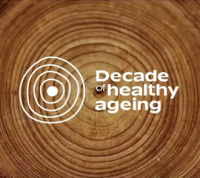 According to the World Health Organization (WHO), one in six people in the world will be aged 60 years or older by the year 2030 (WHO, 2022). Fueled by the rapid ageing of the global population, demand is escalating for robust programs, policies, and activities to improve the lives of older persons.
According to the World Health Organization (WHO), one in six people in the world will be aged 60 years or older by the year 2030 (WHO, 2022). Fueled by the rapid ageing of the global population, demand is escalating for robust programs, policies, and activities to improve the lives of older persons.
Building Forward Together: Ending Persistent Poverty, Respecting all People and Our Planet
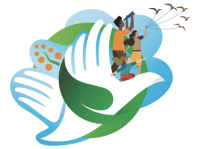 One of the devastating effects of the COVID-19 pandemic is that up to163 million people have been pushed into poverty, joining 1.3 billion people already living in persistent poverty (United Nations, 2021c).
One of the devastating effects of the COVID-19 pandemic is that up to163 million people have been pushed into poverty, joining 1.3 billion people already living in persistent poverty (United Nations, 2021c).
UN Day 2021: Creating A Blueprint For A Better Future With a Focus on the Role of the United States
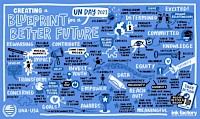 On October 24, 1945, the United Nations (UN) Charter came into effect and the 51 states who had signed the charter became the founding members of the organization, representing countries from all regions of the world, including the Unites States of America (US) (Dag Hammarskjöld Library, n.d.).
On October 24, 1945, the United Nations (UN) Charter came into effect and the 51 states who had signed the charter became the founding members of the organization, representing countries from all regions of the world, including the Unites States of America (US) (Dag Hammarskjöld Library, n.d.).
Coronavirus Status and Mental Health Worldwide: Selected Country Reports from Students in the “Psychology at the United Nations” Class
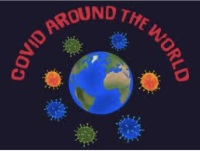
During Spring 2020, the COVID-19 pandemic was ravaging countries around the world. Schools at all levels of learning were closed to prevent the spread within the academic community.
Two IAAP Events at the United Nations High-level Political Forum on Sustainable Development
IAAP had two major successful events held July 12 during the important United Nations High-level Political Forum on Sustainable Development.
Food Waste Mitigation: Achieving Sustainable Development, Well-being, and Hunger Eradication, Applying Behavior Science in the Model Case of South Korea, and Advancing COVID-19 Recovery
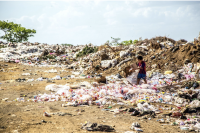 On a global scale, humanity throws out approximately 1.3 billion tons of food a year, or one-third of all of the food that is grown (Sengupta, 2017). This presents an urgent problem, considering statistics that the world population is expected to grow to over 10 billion people by 2050, and that when coupled with the crises caused by climate change, agricultural production will need to expand by approximately 70 percent by 2050 to meet humanity’s basic food and fiber needs (“Water in Agriculture”, 2020).
On a global scale, humanity throws out approximately 1.3 billion tons of food a year, or one-third of all of the food that is grown (Sengupta, 2017). This presents an urgent problem, considering statistics that the world population is expected to grow to over 10 billion people by 2050, and that when coupled with the crises caused by climate change, agricultural production will need to expand by approximately 70 percent by 2050 to meet humanity’s basic food and fiber needs (“Water in Agriculture”, 2020).
Indigenous Peoples in North America: An Overview of Progress and Report of the Regional Dialogues for the United Nations Permanent Forum on Indigenous Issues
 Numbering over 370 million people in over 70 countries around the world on every continent, Indigenous Peoples are practitioners and knowledge-bearers of distinct cultural, ecological, spiritual, health and healing practices, as well as systems of governance. Yet tragically, the rights of Indigenous Peoples have been violated worldwide through processes of colonization involving forced relocation as well as removal of children from their families. Large numbers of children were often placed in residential schools, where they suffered severe psychological and physical abuse.
Numbering over 370 million people in over 70 countries around the world on every continent, Indigenous Peoples are practitioners and knowledge-bearers of distinct cultural, ecological, spiritual, health and healing practices, as well as systems of governance. Yet tragically, the rights of Indigenous Peoples have been violated worldwide through processes of colonization involving forced relocation as well as removal of children from their families. Large numbers of children were often placed in residential schools, where they suffered severe psychological and physical abuse.
Financing an NGO Addressing Mental Health and Poverty Even During and After a Pandemic: A Review and How-to Guide
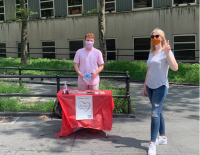
“How are we going to pay for it?” That’s arguably the most overwhelming question facing brave humanitarians who want to start a non-for-profit organization or non-governmental organization (NGO). Another daunting coincidental question is, “Who’s going to pay for it?” These vital questions apply to starting the organization and also sustaining its entire existence. Like me, you can have a passion to improve worldwide food insecurity, for example, but unless you have funding for the project, how will it ever be accomplished?
Taking Well-being to the Next Step: Launch of the WISE Centre and Innovations in Government Policy Responding to the Coronavirus Pandemic
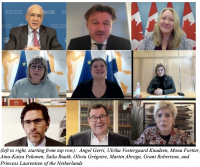 The construction of human well-being, which integrates components of health, connection, and psychosocial safety, is increasingly recognized as a salient variable within the work of international development. The recent creation of the WISE Centre, on Well-being, Inclusion, Sustainability and Equal Opportunity, launched by the Organisation for Economic Co-operation and Development (OECD), is a notable advance in the research, definition and measurement of well-being, which is increasingly important, given the heightened awareness and attention to the concept of well-being among diverse stakeholders involved in policymaking and the achievement of the global goals.
The construction of human well-being, which integrates components of health, connection, and psychosocial safety, is increasingly recognized as a salient variable within the work of international development. The recent creation of the WISE Centre, on Well-being, Inclusion, Sustainability and Equal Opportunity, launched by the Organisation for Economic Co-operation and Development (OECD), is a notable advance in the research, definition and measurement of well-being, which is increasingly important, given the heightened awareness and attention to the concept of well-being among diverse stakeholders involved in policymaking and the achievement of the global goals.
The Big Event for Mental Health: A WHO initiative on Global Awareness and Investment in World Mental Health
A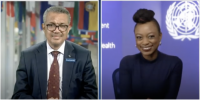 nnually on October 10, World Mental Health Day is celebrated around the world to advance advocacy and awareness about mental illnesses and acknowledge its effects on daily life. With these goals in mind, the first-ever event on this day, sponsored by the World Health Organization (WHO), was celebrated this year. The event highlighted advances and preventive measures in mental health care worldwide. The event also promoted mental health advocacy in collaboration among governmental, non-governmental, public agency partners, and individuals worldwide.
nnually on October 10, World Mental Health Day is celebrated around the world to advance advocacy and awareness about mental illnesses and acknowledge its effects on daily life. With these goals in mind, the first-ever event on this day, sponsored by the World Health Organization (WHO), was celebrated this year. The event highlighted advances and preventive measures in mental health care worldwide. The event also promoted mental health advocacy in collaboration among governmental, non-governmental, public agency partners, and individuals worldwide.
World Mental Health Day 2020: A 24-hour Virtual March for Mental Health
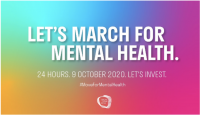 A first-of-its-kind virtual March for Mental Health was held on this year’s World Mental Health Day, with a wide variety of guest speakers and inspiring messages, divided into diverse topics, presented over a 24-hour period. This report is an overview of that event, its history, details about selected topics, and personal reflections about the importance of the celebration.
A first-of-its-kind virtual March for Mental Health was held on this year’s World Mental Health Day, with a wide variety of guest speakers and inspiring messages, divided into diverse topics, presented over a 24-hour period. This report is an overview of that event, its history, details about selected topics, and personal reflections about the importance of the celebration.
Women of the Diaspora Summit: Improving Gender and Racial Quality
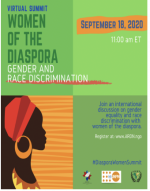 High level officials from around the world gathered on Zoom for the “2020 Women of the Diaspora Summit” held on Friday, 18 September 2020. This virtual event was hosted by the African Renaissance and Diaspora Network (ARDN). Established in the 1990s and headquartered in New York City, ARDN is an NGO that works to support unity between the countries of Africa and all people of African descent worldwide.
High level officials from around the world gathered on Zoom for the “2020 Women of the Diaspora Summit” held on Friday, 18 September 2020. This virtual event was hosted by the African Renaissance and Diaspora Network (ARDN). Established in the 1990s and headquartered in New York City, ARDN is an NGO that works to support unity between the countries of Africa and all people of African descent worldwide.
The Red Card Campaign: Global Launch Against All Forms of Violence and Discrimination Against Women and Girls
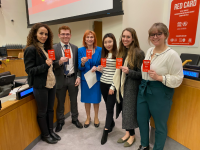 The mission of The Red Card Campaign is to end the discrimination and violence of women and girls around the globe. The U.S. campaign was launched at a major meeting at the United Nations headquarters in New York City, occurring amidst major upheaval throughout New York City and countries around the world facing the dangerous epidemic outbreak of a new strain of Coronavirus, called COVID-19. The event was one of the last held at the UN headquarters before the building was put in lockdown to prevent the virus spread and all events moved online to be held virtually.
The mission of The Red Card Campaign is to end the discrimination and violence of women and girls around the globe. The U.S. campaign was launched at a major meeting at the United Nations headquarters in New York City, occurring amidst major upheaval throughout New York City and countries around the world facing the dangerous epidemic outbreak of a new strain of Coronavirus, called COVID-19. The event was one of the last held at the UN headquarters before the building was put in lockdown to prevent the virus spread and all events moved online to be held virtually.
“United Nations Peace Day Youth Summit”: Celebration and Awareness-Raising for the Sustainable Development Goals
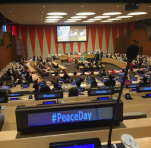 The importance of youth participation and voices at the United Nations is currently a major theme. The Third Annual Peace Day Youth Summit was held at United Nations headquarters in New York City on 15 September 2017, a few days earlier than the official Peace Day on 21 September. Over 500 engaged young people and global leaders came together to discuss the Sustainable Development Goals (SDGs) and to share about actions the government, businesses, and young people are taking towards achieving the SDGs.
The importance of youth participation and voices at the United Nations is currently a major theme. The Third Annual Peace Day Youth Summit was held at United Nations headquarters in New York City on 15 September 2017, a few days earlier than the official Peace Day on 21 September. Over 500 engaged young people and global leaders came together to discuss the Sustainable Development Goals (SDGs) and to share about actions the government, businesses, and young people are taking towards achieving the SDGs.
Under the Spotlight: Ending Violence Against All Women and Girls: A side event at the UN Commission on the Status of Women
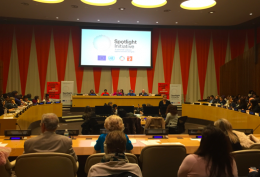 On the first day of the 62nd Commission on the Status of Women, the European Union hosted a high-level discussion on the Spotlight Initiative, a global campaign to eliminate all forms of violence against women and girls (VAWG). The European Union and United Nations partnered to create this initiative, which launched in September 2017, and representatives from both organizations, in addition to civil society leaders, participated in the event. The event aimed to raise awareness about the magnitude and ubiquity of VAWG, and to highlight the gaps in current prevention and response, and the initial efforts undertaken by the Spotlight Initiative to address this issue of violence against women and girls. Of particular focus was how to ensure that women and girls in marginalized populations are engaged and included in the initiative.
On the first day of the 62nd Commission on the Status of Women, the European Union hosted a high-level discussion on the Spotlight Initiative, a global campaign to eliminate all forms of violence against women and girls (VAWG). The European Union and United Nations partnered to create this initiative, which launched in September 2017, and representatives from both organizations, in addition to civil society leaders, participated in the event. The event aimed to raise awareness about the magnitude and ubiquity of VAWG, and to highlight the gaps in current prevention and response, and the initial efforts undertaken by the Spotlight Initiative to address this issue of violence against women and girls. Of particular focus was how to ensure that women and girls in marginalized populations are engaged and included in the initiative.
Mental Health & Well-Being Advocacy and Programs Implementing the Global Agenda, and A Spotlight on Mental Illness and Minority Identities
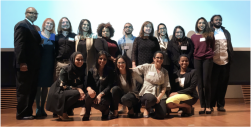 On 21 April 2017, the 2nd Annual Mental Health Awareness Conference was held at Teachers College, Columbia University, entitled, “From the Margins to Mainstream: A spotlight on the intersection of mental illness and minority identities.” The purposes of the conference are awareness-raising about mental illness, fostering conversation and combating stigma.
On 21 April 2017, the 2nd Annual Mental Health Awareness Conference was held at Teachers College, Columbia University, entitled, “From the Margins to Mainstream: A spotlight on the intersection of mental illness and minority identities.” The purposes of the conference are awareness-raising about mental illness, fostering conversation and combating stigma.
“Economic Empowerment of Women: Lessons from Armenia”: Panel Discussion at the Non-Governmental Organization (NGO) Forum, United Nations Commission on the Status of Women (CSW61)
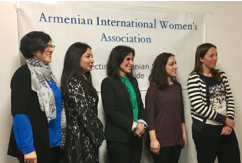 An audience of about 40 people gathered in Yerevan Hall of the Armenian Convention Center in New York City on 17 March 2017 to hear panelists discuss strategies and ongoing projects that involve the economic empowerment of women in Armenia. Panelists came from backgrounds in entrepreneurship, domestic violence protection and support, and professional women’s organizations. This parallel event for the United Nations Commission on the Status of Women was organized by the Armenia International Women’s Association.
An audience of about 40 people gathered in Yerevan Hall of the Armenian Convention Center in New York City on 17 March 2017 to hear panelists discuss strategies and ongoing projects that involve the economic empowerment of women in Armenia. Panelists came from backgrounds in entrepreneurship, domestic violence protection and support, and professional women’s organizations. This parallel event for the United Nations Commission on the Status of Women was organized by the Armenia International Women’s Association.
The United Nations Forum on Science, Technology and Innovation: An overview of Sessions and Lessons Learned, Part One
 Envision a sustainable world achieved through the innovative use of technology. The Second Annual Forum on Science, Technology, and Innovation (STI) for the Sustainable Development Goals (SDGs) is dedicated to realizing the potential of technology in achieving sustainability around the world. As an intern to the International Association for Applied Psychology, I attended the forum with great curiosity and enthusiasm.
Envision a sustainable world achieved through the innovative use of technology. The Second Annual Forum on Science, Technology, and Innovation (STI) for the Sustainable Development Goals (SDGs) is dedicated to realizing the potential of technology in achieving sustainability around the world. As an intern to the International Association for Applied Psychology, I attended the forum with great curiosity and enthusiasm.
“Young Women’s Leadership and Voices at the UN”: event at the UN Commission on the Status of Women
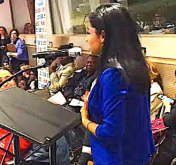 Young women are demanding that their voice be heard at the United Nations. And they insist their voice is different from that of women of other ages. Older women agree.
Young women are demanding that their voice be heard at the United Nations. And they insist their voice is different from that of women of other ages. Older women agree.
This passionate appeal was made at an NGO-led briefing entitled “Young Women’s Leadership and Voices at the UN” held at the United Nations headquarters in NYC on 21 March 2017.
The Role of Education in Enhancing Social Cohesion in Post Conflict Settings
Date: Tuesday 27 September 2016 Location: United Nations Headquarters, Conference Room 5, New York, NY 10017 Moderator: Mr. Jasim Sady Al-Najmawi, Manager of International Monitoring and Evaluation Department, Qatar Charity Speakers: Mr. Mohammed bin Ali Al-Ghamdi, Executive Director of International Development, Qatar Charity; Dr. Mohammed Cherkaoui, George Mason University, School for Conflict Analysis and Resolution; Mr. Abdurahman Sharif, Director of the Somalia NGO Consortium...
World Tsunami Awareness Day at the United Nations
On Thursday, 3 November 2016, the United Nations Office for Disaster Risk Reduction (UNISDR) brought together an esteemed panel of representatives from Japan, Chile, Indonesia, and the Maldives, as well as UNESCO and CBM International, to discuss the launch of World Tsunami Awareness Day on 5 November 2016. Dr. Pamela Falk, UN Resident Correspondent, CBS News TV and Radio, moderated the panel discussion. H.E. Mr. Teru Fukui, Member of House of Representatives and Former State Minister of Educati...
New York City THRIVE Mental Health Initiative Presented at the United Nations
Date: Wednesday 25 January 2017 Location: United Nations Headquarters, Economic and Social Council Chamber, 1st Avenue and 45th Street, New York, NY 10017 Speakers: Chirlane McCray, First Lady of NYC; Ambassador Dessima Williams, Special Adviser, Implementation of the SDGs, Office of the President of the General Assembly (PGA); H.E. Caleb Otto, Ambassador of the Permanent Mission of Palau, Richard Buery, NYC Deputy Mayor for Strategic Policy Initiatives Panelists: Dr. Gary Belkin, NYC E...
International Peace Institute Global Leaders Series topic: A Changing World: Can Institutions Cope?
H.E. Ms. Kristalina Georgieva, Vice President of the European Commission, served as speaker during the International Peace Institute’s Global Leaders Series on 22 September 2016. The session was titled “A Changing World: Can Institutions Cope?” Georgieva began her talk by discussing how the current speed and complexity of change are unparalleled, and as such, pose a major challenge for institutions that are better adapted to the slow-paced changes of the 20th century. Although rapid change co...
What does it mean to be a man? Achieving gender equality for all through respect, education and cooperation
On Thursday 17 November 2016, the NGO Committee on Children’s Rights organized a round-table discussion, “What does it mean to be a man? Achieving gender equality for all through respect, education and cooperation,” in commemoration of the 27th anniversary of the Convention on the Rights of the Child. Speakers Mr. Ravi Karkara, Senior Advisor Strategic Partnership and Advocacy to the Assistant Secretary-General/Deputy Executive Director UN Women, and Mr. Quentin Walcott, Co-Executive Director...
United Nations Department of Public Information Non-Governmental Organization’s (DPI/NGO) Youth-Led Briefing: 1+4=16 Targeting Poverty and Education for Peace
The United Nations Department of Public Information Non-Governmental Organization (DPI/NGO) Youth-Led Briefing: "1+4=16 Targeting Poverty and Education for Peace" focused on increasing youth involvement in the implementation of the 2030 Sustainable Development Goals (SDGs) 1, 4, and 16: No poverty + Quality education = Peace, justice, and strong institutions. A panel predominantly of youth leaders described the importance and intersection of these SDGs in the context of their past and ...
Mental Health and Well-being at the Heart of the SDGs: Concrete Means of Implementation
Celebrating a Historic Event The 2030 Agenda for Sustainable Development was adopted by world leaders on 25 September 2015. The Agenda contains a promise to “promote mental health and well-being”. This side event at the United Nations was the first to focus on this promise. The event brought together UN Ambassadors, representatives of the World Health Organization, the Clinton Global Initiative, the International Association of Applied Psychology, and civil society organization...
A Psychological Analysis from a New Biography of former South African President Thabo Mbeki
By Qi Xie “I didn’t want to write a hagiography,” said author Dr. Adekeye Adebajo at the book signing event for his new biography of Thabo Mbeki, South Africa’s second post-apartheid president, held at the New York headquarters of the noted think tank, the International Peace Institute (IPI). Indeed, Adebajo’s account of Mbeki’s life does not idealize, but rather exposes highlights and also the underbelly of the politician credited for overseeing a growing ...
The World Humanitarian Summit (May 2016)
After the Adoption of the Post-2015 Transformative Agenda: Report on Post-Adoption Meetings with Permanent Missions of Ireland, Germany, the Netherlands, and Brazil to the United Nations
Following the adoption of the post-2015 transformative agenda at the intergovernmental negotiations (IGN) at the United Nations (UN), the means of implementation (MoIs) will now be the primary focus of governments, as they strive to fulfill the 17 goals and 169 targets of the Sustainable Development Goals (SDGs) by 2030 – the year concluding the SDGs. On Tuesday, 4 August 2015 -- two days immediately following the historical adoption of the ...
Recommendations for the Sustainable Development Goals at the 2015 Intergovernmental Negotiations: Psychological Contributions Across the Agenda, including Well-being, Human Rights, Resilience, Racism, and Beyond GDP
Submitted to the Co-Chairs of the Intergovernmental Negotiations by Judy Kuriansky, Chair of the Psychology Coalition at the United Nations (PCUN) and main representative of the International Association of Applied Psychology (IAAP), and Corann Okorodudu, past PCUN Chair, June 2015
Proposal to Include Mental Health, Stress Related Disorders and Psychosocial Wellbeing in the Health Targets for the Open Working Group on Sustainable Development Goals
Submitted by Dr. Judy Kuriansky (Chair) on behalf the Psychology Coalition at the United Nations (PCUN) on the occasion of the 10th Session of the Open Working Group (OWG) on Sustainable Development Goals (SDGs), 31 March - 4 April 2014, UN Headquarters, New York. Co-sponsored by PCUN members including the International Association of Applied Psychology (IAAP), the World Council for Psychotherapy (WCP), and the Order of Portuguese Psychologists (OPP)*.
Stakeholder Feedback for the Elements Paper and the Declaration: Support for Mental Health and Wellbeing (submitted February 2015)
It is important to build on the success achieved by the inclusion of health as Goal 3 of the proposed Sustainable Development Goals (SDGs) and of “promote mental health and wellbeing” in Target 3.4. The rationale for specifically including “mental health and wellbeing” is vast, given the numerous UN conventions, resolutions and conference outcome documents that mention mental health and wellbeing (see below); the reciprocal relationship between phys...
IAAP UN Team Report: Economic and Social Council 2015 Annual Partnerships Forum
Partnership, together with People, Planet, Prosperity and Peace, constitutes one of the five overarching themes – referred to as the "Five Ps" – around which the Post-2015 Development Agenda has been formulated. Indeed, the Preamble to the outcome document set for formal adoption by all 193 Member States at the UN Summit in September 2015 underlines the importance of “all countries and all stakeholders, acting in collaborative...
IAAP UN Team Report: Nelson Mandela International Day 2015 - The UN Presents The First Nelson Rolihlahla Mandela Prize
Nelson Mandela International Day is celebrated annually at The United Nations on 18 July, Nelson Mandela’s birthday, to commemorate the legacy of the anti-apartheid hero who went on to become President of South Africa. This year, the UN headquarters in New York held a plenary on 24 July from 10am-12pm in the Trusteeship Council Chamber to celebrate Mr. Mandela’s life and accomplishments, and to award the inaugural UN Nelson Rolihlahla Mandela Prize (NRMP). The honorees were Dr. Helena ...
IAAP UN Team Report: Summer 2015 Youth Assembly at The United Nations - Youth as Part of The Transformative Post-2015 Agenda
Throughout the various sessions held at The United Nations over the past two years during the adoption process for the Post-2015 Transformative Agenda, references have consistently been made to the key role that youth play, both in defining the agenda and in identifying effective means of implementation. From 5-7 August 2015, the 14th Youth Assembly at The United Nations (YA@UN) was held, bringing together hundreds of youth delegates from all over the world. This event, as s...
IAAP UN Team Report: International Peace Institute 'Liberia in Transition' Event
With the threat of Ebola still sadly present in Liberia, awareness about issues in this West African country is particularly important at this time. An event entitled 'Liberia in Transition' was held by the International Peace Institute (IPI), as part of their series on 'Special Representatives of the Secretary-General' (SRSGs), on Tuesday, 7 July 2015, from 13:00-14:30. Ms. Karin Landgren, SRSG to Liberia and Coordinator of United Nations Mission in Liberia (UNMIL), nearing the end of...
IAAP UN Team Report: On the Road to Achieving Sustainable Development Goal 14 on Oceans, Seas and Marine Resources
Climate change. What does that mean to the world in the context of the new Sustainable Development Goals (SDGs) from the years 2015-2030? At the United Nations, the discussion about climate change is pivotal in advancing the movement for environmental conservation and sustainability. It is also a high priority for the UN Secretary-General ahead of the major meetings set to take place at COP21 in Paris this December, where it is hoped the member state governments will reach a consensus on urgent ...
